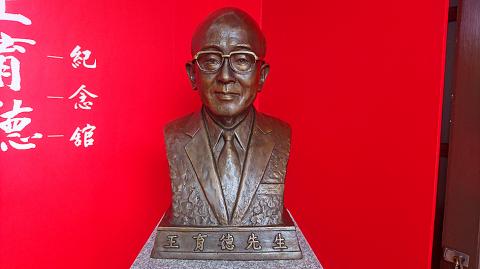A museum dedicated to independence activist Ong Iok-tek (王育德) yesterday opened at his former residence in Tainan, where he lived with his elder brother Ong Iok-lim (王育霖).
Born in 1924, Ong Iok-tek was a spiritual leader and forerunner of the Taiwanese independence movement in Japan. He was also an expert on the Hoklo language (commonly known as Taiwanese).
Ong Iok-lim, who was born in 1919, was the first Taiwanese prosecutor in the Japanese Empire.

Photo: Liu Wan-chun, Taipei Times
After World War II, he returned to Taiwan and served as a prosecutor in Hsinchu City, but resigned after investigating then-Hsinchu mayor Kuo Shao-tsung (郭紹宗) for corruption.
Ong Iok-lim was killed during the 228 Incident in 1947.
In 1949, Ong Iok-tek fled to Japan through Hong Kong with only one suitcase in hand.
In 1960, while in Japan, he founded the Taiwan Youth Society, a political group that published a magazine titled Taiwan Youth (台灣青年).
In 1969, he received a doctorate from the University of Tokyo for his studies on Hoklo, becoming the first person to do so.
In 1974, he began campaigning for the rights of Taiwanese who had served in the Japanese military during the Japanese colonial era, but died of a heart attack in 1985, at the age of 61, before he could see the result of his efforts.
In 1986, the Japanese government passed a resolution to pay ¥2 million (US$18,017 at the current exchange rate) to each of the families of the Taiwanese soldiers who were killed in combat or to survivors who had been severely injured.
In 2002, Avanguard Publishing House published the complete works of Ong Iok-tek in Chinese.
Originally written in Japanese, Taiwan: A History of Agonies (台灣 — 苦悶的歷史), which has also been translated into English, is one of Ong Iok-tek’s most important works and is made up of 15 volumes.
Ong Iok-tek’s 93-year-old wife, Wang Mei-hsueh (王雪梅), daughter Wang Ming-lee (王明理) and granddaughter Aya Kondo, as well as other family members, traveled from Japan to attend yesterday’s plaque hanging and opening ceremony at the museum.
Several Japanese reporters were also present.
Many of Ong Iok-tek’s personal belongings are exhibited at the museum, including the suitcase he carried when he fled Taiwan, his report cards from school, photographs, manuscripts and clothing.

US President Donald Trump said "it’s up to" Chinese President Xi Jinping (習近平) what China does on Taiwan, but that he would be "very unhappy" with a change in the "status quo," the New York Times said in an interview published yesterday. Xi "considers it to be a part of China, and that’s up to him what he’s going to be doing," Trump told the newspaper on Wednesday. "But I’ve expressed to him that I would be very unhappy if he did that, and I don’t think he’ll do that," he added. "I hope he doesn’t do that." Trump made the comments in

NOT AN OPENING: Trump’s violation of international law does not affect China’s consideration in attacking Taiwan; Beijing lacks capability, not precedent, an official said Taiwanese officials see the US’ capture of the president of Venezuela as a powerful deterrent to Beijing’s aggression and a timely reminder of the US’ ability to defeat militaries equipped with Chinese-made weapons. The strikes that toppled Venezuelan President Nicolas Maduro signaled to authoritarian leaders, including Chinese President Xi Jinping (習近平), US President Donald Trump’s willingness to use military might for international affairs core to US interests, one senior official in Taipei’s security circle said. That reassured Taiwan, the person said. Taipei has also dismissed the idea that Trump’s apparent violation of international law could embolden Beijing, said the official, who was not

A cold surge advisory was today issued for 18 cities and counties across Taiwan, with temperatures of below 10°C forecast during the day and into tonight, the Central Weather Administration (CWA) said. New Taipei City, Taipei, Taoyuan and Hsinchu, Miaoli and Yilan counties are expected to experience sustained temperatures of 10°C or lower, the CWA said. Temperatures are likely to temporarily drop below 10°C in most other areas, except Taitung, Pingtung, Penghu and Lienchiang (Matsu) counties, CWA data showed. The cold weather is being caused by a strong continental cold air mass, combined with radiative cooling, a process in which heat escapes from

Snow this morning fell on Alishan for the first time in seven years, as a strong continental cold air mass sent temperatures plunging across Taiwan, the Central Weather Administration (CWA) said. The Alishan weather station, located at an elevation of about 2,200m in central Taiwan, recorded snowfall from 8:55am to 9:15am, when the temperature dropped to about 1°C, the CWA said. With increased moisture and low temperatures in the high-altitude Alishan area, the conditions were favorable for snow, CWA forecaster Tsai Yi-chi (蔡伊其) said. The last time snow fell at the Alishan weather station was on Jan. 10, 2018, while graupel fell there